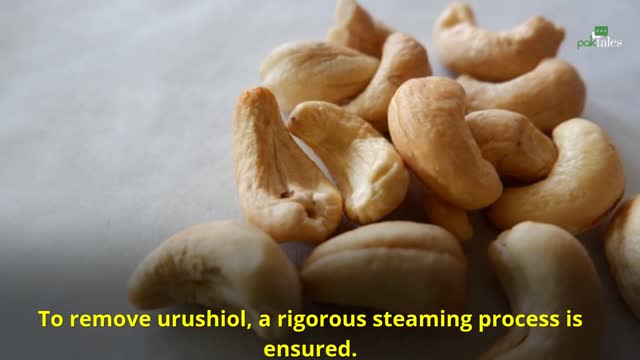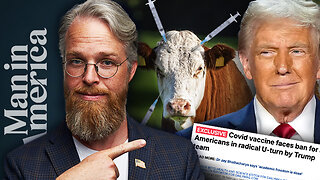Premium Only Content

Are Cashews Poisonous ? Toxic Truth about Cashew Poison
Remember when cashews broke the internet? Twitter could not get over the fact that the delicious nuts are grown inside cashew apples. You, of course, buy them without the shell. That's part of the reason that cashews are so expensive, because someone has to de-shell them before they hit the grocery store. But the harvesting process for cashews is not only time and labor-intensive, it is also toxic. Cashews, it turns out, are like poison ivy and poison sumac. They can cause hyper-pigmented skin lesions and toxic hepatitis, according to health experts. To make them safe for us to eat, cashew harvesters dry the nuts, remove them from their shell, and steam or roast them.
Here is the problem: According to the Trade for Development Centre, only three percent of cashews sold on world markets are Fair Trade Certified. And a Human Rights Watch report documents how many cashew harvesters are forced to work for misery wages, and in extremely precarious conditions. And if they want safety equipment to protect against cashew toxins? They have to pay for it themselves, when available.
Cashews are undoubtedly healthy for you. They are high in protein and good for your skin, your bones, and your hair. But at what cost?
Vietnamese cashew farms were the first to come under scrutiny. A 2011 Human Rights Watch report found workers at "drug rehabilitation centers" forced to harvest roughly 4,800 nuts a day for under $3 a month as part of their "therapy." Workers suffered hand burns, respiratory problems, and other allergic reactions as a result of working with the cashews. Punishments for slow work, refusal to work, or breaking any "rules" unbelievably included beatings, sometimes with electrified batons.
A 2018 investigation by Ethical Trading Initiative Norway uncovered more disturbing trends. For one thing, there are instances of child labor on these farms. Second, while international scrutiny forces big export companies to uphold certain labor rights laws, they often rely on subcontractors for labor. Subcontractors do not respond to the same standards, and cashew harvesters employed by subcontractors work long hours without benefits and with very limited safety training. Third, many cashew farms fail to use safe levels of pesticides and herbicides. Even when they do, these pesticides and herbicides often spill into waterways, contaminating the water wells in local communities.
Raw cashews are produced not only in Vietnam, but India, Cambodia and also, notably, West African countries. This raises the question: Are working conditions for cashew harvesters better in other parts of the world? Sadly, the short answer is probably not.
"They have to start early in the morning, so they'll work fast and they'll earn something."
Labor watchdog Verité, for example, has found young children harvesting cashews in Africa. And in 2019, an Action Aid investigation found women in India harvesting cashews, without safety equipment, for pitiful wages. Like in Vietnam, Action Aid's report documented respiratory and skin complications among Indian cashew harvesters, the majority of whom are women, because they compose most of the workforce.
Even more troubling is that, according to a report published in Agronomy for Sustainable Development, these women workers are often left unprotected by labor legislation, and therefore receive lower wages, and work in more dangerous conditions than men. These conditions are sometimes so dire that they affect the workers' reproductive health.
If you are a cashew lover, you're undoubtedly wondering whether there is still a way to eat cashews ethically. One way to do so might be to find and buy Fairtrade certified nuts. As Fair Trade Canada explains, Fairtrade certification requires that cashew workers be paid fair wages. It also stipulates certain safety precautions that protect worker's health, including having workers coat their hands in vegetable oil to prevent burns.
Fairtrade certification, of course, is not without its pitfalls. For one, it may be difficult to find Fair Trade certified cashews. As the Belgian Trade For Development Centre reports, in 2018, there were only 12 certified Fair Trade cashew producers in all of Asia.
There are also serious questions about how effective a Fairtrade certification actually is. While, in theory, working conditions on a Fairtrade farm are monitored by a third party, in 2016 The Guardian reported that this does not guarantee that workers will not be paid poverty wages. This report backs up a 2014 SOAS University London investigation which found that workers on Fairtrade certified farms in Uganda and Ethiopia had, in fact, no access to community facilities such as schools, health clinics, and sanitary facilities that Fairtrade International supposedly contributed to. Furthermore, they were paid lower wages than on other farms.
https://www.paktales.com/are-cashews-poisonous-toxic-truth-about-cashew-poison/
-
![🔴[LIVE TRADING] The Crypto Crash, Stock Bounce & Breaking News || The MK Show](https://1a-1791.com/video/fwe2/00/s8/1/w/g/I/k/wgIky.0kob.2-small-LIVE-TRADING-The-Crypto-Cra.jpg) LIVE
LIVE
Matt Kohrs
11 hours ago🔴[LIVE TRADING] The Crypto Crash, Stock Bounce & Breaking News || The MK Show
1,759 watching -
 LIVE
LIVE
Dear America
1 hour agoTrump: Russia/Ukraine Peace Deal IMMINENT! + Tucker RESPONDS To Crenshaw!
4,522 watching -
 45:09
45:09
BonginoReport
3 hours agoNSA Perverts Caught & FIRED (Ep.148) - 02/26/2025
29.1K54 -
 LIVE
LIVE
Wendy Bell Radio
5 hours agoLet's Make A Deal
12,090 watching -
 LIVE
LIVE
AP4Liberty
2 hours ago $0.57 earnedElon Musk's Foray into Comedy: Public Reacts
971 watching -
 2:39:16
2:39:16
TimcastIRL
14 hours agoDemocrat CAUGHT ON TAPE ADMITTING To Corruption, CHEATING ON WIFE Says Nick Sortor | Timcast IRL
243K98 -
 1:02:08
1:02:08
Man in America
19 hours agoTrump to BAN the COVID Vaxx?! mRNA in Your Organic Meat?! w/ Kim Bright
111K89 -
 57:42
57:42
Flyover Conservatives
1 day agoThe Great Gold Cover-Up: Is Fort Knox EMPTY?! - Clay Clark + Dr. Kirk Elliott | FOC Show
76.4K24 -
 1:24:40
1:24:40
Kim Iversen
17 hours agoJeffrey Sachs Just Exposed the Truth They Don’t Want You to Hear
94.4K111 -
 2:11:32
2:11:32
Glenn Greenwald
15 hours agoGlenn From Moscow: Russia Reacts to Trump; Michael Tracey Debates Ukraine War | SYSTEM UPDATE #413
231K115